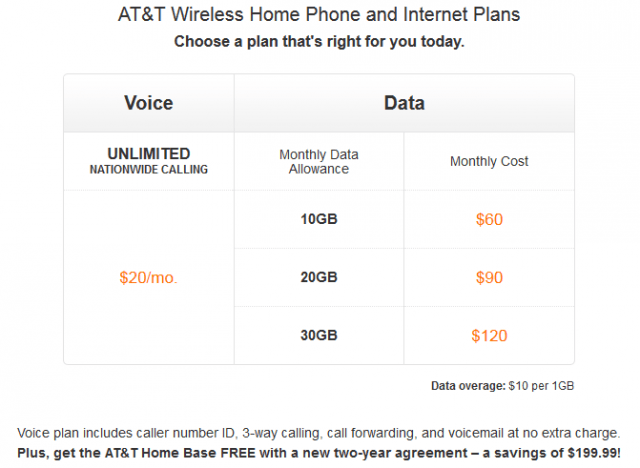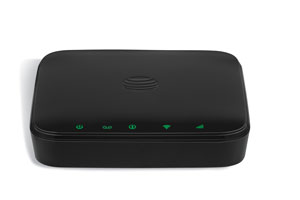AT&T’s solution for rural Americans without access to broadband service arrived this week with the introduction of an $80/month plan bundling a mandatory wireless home landline with a 10GB usage-capped Internet plan.
AT&T Wireless Home Phone and Internet has undergone market testing in selected northeastern areas (largely outside of AT&T’s landline service territory). This week the service became available nationwide and is marketed to customers disconnected (or soon will be if regulators approve) from AT&T’s traditional landline service. AT&T is petitioning to dismantle its rural and outer suburban wired landline network and transfer customers to wireless service. But AT&T’s wireless replacement is both expensive and usage capped with an allowance that is just a fraction of what AT&T DSL offers:

- Customers start with a $20/month wireless landline phone replacement, powered by AT&T’s wireless network. Customers will keep their current phone number and home phones and will be sent a “Home Base” device that will interface between AT&T’s wireless network and up to two telephones. AT&T does not permit its device to be connected to your existing home phone wiring, so it strongly urges customers to buy cordless phones. The device is portable so it can be taken with you when traveling. The standalone service offers unlimited nationwide calling, Voicemail, caller ID and call waiting;
- Those interested in also purchasing broadband can add one of three different data plans: $60 for 10GB, $90 for 20GB and $120 for 30GB. AT&T charges a $10 overlimit fee for each extra gigabyte. You cannot buy broadband service unless you also subscribe to AT&T’s wireless landline product. That means the lowest possible price for rural broadband is $80 a month for up to 10GB of usage. Access may be over AT&T’s 4G LTE network (5-12Mbps maximum speeds) or their much-slower, but more common 3G network. In contrast, AT&T sells DSL for as little as $15 a month with a 150GB usage allowance included.
[flv]http://www.phillipdampier.com/video/ATT Wireless Home Phone Internet Intro 5-2014.flv[/flv]
AT&T introduces its new solution for rural America — wireless home phone and Internet service, at a price much higher than what urban customers pay. (1:42)

AT&T’s Home Base
AT&T’s Wireless Home Phone and Internet includes plenty of fine print and disclaimers:
- A two-year service commitment is required to avoid a $199 charge for the Home Base device;
- 911 service is not guaranteed and you will be required to give your physical location to the 911 operator so they can send help to the proper address;
- A backup battery powers the Home Base allowing up to 1.5 hours of talk time and 18 hours of standby time. However, a standard corded phone that does not need electric power to operate is required to place or receive calls (including 911) during a power outage;
- Not compatible with wireless messaging services/text messaging, home security systems, fax machines, medical alert & monitoring systems, credit card machines, IP/PBX Phone systems, or dial-up Internet service. May not be compatible with DVR/Satellite systems;
- Call quality, wireless coverage, and service reliability are not guaranteed;
- Well-qualified credit approval required;
- An activation fee (undisclosed) also applies.
There are many surcharges that also may apply, including a $35 restocking fee, federal, state, and local taxes and the universal service fee. Customers must also pay AT&T-originated fees kept by AT&T, including a $1.25 “cost recovery charge,” a gross receipts surcharge, administrative fees and any government-originated assessments that AT&T passes on to customers in various states.
[flv]http://www.phillipdampier.com/video/ATT Wireless Home Phone Internet Setup 5-2014.flv[/flv]
AT&T explains how to set up and configure its Home Base to receive phone and broadband service wirelessly. (3:16)


 Subscribe
Subscribe
Okay, wait a moment. I just read something that seems conflicting. The story said.. ” AT&T does not permit its device to be connected to your existing home phone wiring, so it strongly urges customers to buy cordless phones. ” Yet goes on to say “A backup battery powers the Home Base allowing up to 1.5 hours of talk time and 18 hours of standby time. However, a standard corded phone that does not need electric power to operate is required to place or receive calls (including 911) during a power outage;” Am I missing something here? It’s urging people… Read more »
I am guessing that they are suggesting the cordless phone(s) for regular usage, but keep an old style corded phone (that does not need an extra power source) around in case of emergencies. They suggest the cordless phones because they do not want you to hook their device up to your in-home phone wiring, so the cordless phone “base station” would plug into their device and share the signal with your other cordless phones, which would allow you to use multiple phones throughout your home without having to rely on the home’s existing phone wiring. In the case of a… Read more »
On top of battery issues and likely degradation of comparable wireline voice quality it doesn’t appear to be integrated with your smartphone to improve your inhome coverage for mobile voice and sms. Duh!
Also, does anyone know the performance of the base station vs a standard smartphone in terms of signal strength or range? This obviously will impact overall throughput, especially during congestion times.
Lastly, Frontier, anticipating both VZW and AT&T is offering a wireline backup solution for $5 month to satisfy some of the above power outage concerns. Hey that’s only 2 starbucks!
It takes a phone company to invent something worse than DSL.
Thats the problem they are a phone company and dont comprehend the difference. Worse yet they are brainwashing the younger generation to beleive that the internet is what they get on their phone and that it should be rationed.
I hate usage caps as much as anybody…but the idea “unlimited usage” doesn’t seem optimal for me. Sure …if you are sucking down 300GB per month… these caps seem crazy. Does a gas station offer you unlimited gasoline for a month? Does the electric company offer you unlimited power? Does the water company offer you unlimited water? Sure…some people want to “fill a swimming pool” and some people want to leave all their lights on 24/7 — Pay for usage is IMHO the most fair plan. The internet providers already track your usage…so why not just bill us per GB… Read more »
You should think of broadband like phone service, not water, electricity or gas. Phone service is most comparable to Internet access. With great capacity advancements at rapidly dropping costs, phone companies have no trouble offering unlimited long distance plans. The costs are now so low, it does not make sense to sell long distance on a per call basis. When is the last time anyone made a station to station collect call or waited until after 5pm when rates were lower. Usage pricing on home broadband is now just a sign of gouging. It would be like charging you for… Read more »
Phil, A couple of issues with your comment. Communications is not like gas, water, electricity, or even roadways. They share similar network effects and economics, but communication networks and services can be narrow/medium/broadband, wired/wireless, synchronous/asynchronous, fixed/mobile, data/voice/multimedia/video, 1-way/2-way, 1-to-1/1-to-many/many-to-many, etc… Both supply and demand are inherently varied and both costed and priced, respectively, at “the margin.” At the same time, your comments are very supply-centric. How do service providers at the edge map demand holistically and completely ex ante in order to build supply to that demand. How do they build to the current mega-trends of 4K VoD, 2-way HD… Read more »
10 gig is useless, 20 and 30 is too expensive. The wirless carriers think their service is gold 10.00 per gig….whatever. This is NOT an answer for rural America. It is AT&T and Verizons further attempts to take advantage of people that have limited choices. There is no reason not to run an unlimited plan for home use…except for greed. We need fixed wireless carriers in rural areas that are not hell bound to take advantage of people. A fixed wireless carrier in Rural S.C. could make a small fortune and still offer a good value. We are being stolen… Read more »
You’re absolutely right, we need better choices for rural internet. In my area, and as I understand, in a lot of rural areas in the US, right now what we have for choices are DigitalPath (a joke; look up their reviews), DirecWay (Also a joke, look up their reviews…Not even sure they’re around anymore…) or one of the big two– Verizon or AT&T (I don’t think Comcast will even install in many places). I have an internet business and live in the country, so I pay AT&T $120 for the 30 gigs of data. I somehow go over every month… Read more »